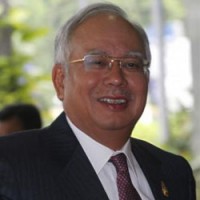Throughout our history, Malaysia’s foreign policy stance has been one broadly aligned with neither East nor West, but with a strong emphasis on development, the rights of the poorest of nations and peoples, and collective strength through the Association of Southeast Asian Nations (Asean). It is a stance that has served the rakyat well, encouraging trade and foreign direct investment while avoiding the terrible reality of the wars that have affected the world and our region in particular.
Whilst maintaining the spirit of that approach, Prime Minister Datuk Seri Najib Razak has placed his own stamp on our foreign policy, and in the process transformed Malaysia’s standing among nations. Where before the Malaysian approach of tolerance and moderation was applied only to our relations with other countries, Najib has made Malaysia something of an evangelist of the power of moderation, and in the process has helped make the country one of the leading international mediators of the day.
While this approach does not begin in 2011, it was formally presented in Najib’s Global Movement of Moderates, an idea praised across the globe for the effort to harness the quiet forces of moderation to defuse extremism and the resort to war. The effort was bolstered by Najib’s public condemnation of suicide bombing; as the first Muslim head of government to take this stand, his credibility in the West leaped significantly.
Najib’s revolutionary insight was that the Malaysian way – a blend of Asean dispute resolution, the historic trade and peace policy of Malaysia’s several peoples, and the majority’s tolerance for the minority – could and should be exported abroad. If, as Najib postulated, conflict and war arose because peoples became locked into extremist positions by virtue of their situations and a lack of contact with each other, it followed that increased human-to-human contact and trade could only help those same peoples find compromise and peace where they had not before.
It is a hard road that Najib has proposed, especially where the conflicts span decades and centuries, but the alternative of war is too terrible not to try.
The result of Najib’s approach has been remarkable. The most obvious accomplishment to which he may point, the end of the conflict between Manila and the Moro Islamic Liberation Front, was as much a dramatic announcement of Malaysia’s new role in the world as it was a diplomatic coup. Najib was able to leverage Malaysia’s natural alignment with the Philippines and the common bonds of Islam to end what many had feared was an intractably violent conflict. In the process, the parties were able to fashion a system based in part on the Malaysian model, which provides some autonomy to Bangsamoro while also keeping the region as a productive part of the Philippines.
This was not merely a compromise; it was something greater than any compromise could have been. Out of the conflict came a new governing model, peace, autonomy, and yet Manila’s hold over its own territory is now secure.
The re-emergence of Myanmar from decades of isolation was yet another achievement for Malaysia under Najib’s guidance. Rather than joining in the isolation of the once-pariah state, Najib’s Government made it a signal goal to keep lines of communication open. As a direct result, Myanmar is moving quickly, if imperfectly, toward a real and functional democracy. Indeed, the method by which the ruling military council has been allowed to slowly, carefully relinquish power neither grants democrats’ fervent desires for immediate democracy, nor hard-liners’ desire to keep power forever; yet allowing both sides some of what they want is making the final goal that much easier to achieve.
This is something that simply would not have been possible but for Najib’s willingness to engage Myanmar’s leadership as equals, rather than as pariahs. Through that open medium of communication, ideas and opportunities were passed along that would have stopped at an embargo wall.
The result is an increasingly-democratic Myanmar re-joining the community of nations.
But there is more. Najib’s Global Movement of Moderates has attracted attention from leaders across the globe, desperate for a new approach to conflict resolution and a way to defuse terrorism and internal conflict. Malaysia has been sought out by NGOs and by nations working desperately to avoid bloodshed while still finding workable solutions.
Malaysia’s credibility is already becoming a lynch-pin in two regions. In the Palestinian-Israeli conflict, Najib has brought Malaysia’s moral weight to bear on behalf of the Palestinians, while nevertheless encouraging Tel Aviv to end the slaughter of the oppressed people and open themselves to moderation. Combined with his extant stance on suicide and its incompatibility with Islam, it will be harder for Israel to reject his encouragement out of hand.
The next great test lies in Asean itself, where China is beginning to re-assert old claims and the several states of the Association are finding it difficult to act with moderation or unison. In many ways, it is here that Najib’s approach will be put to the test, as vital questions of sovereignty, control of waterways, and national pride are beginning to conflict in potentially violent ways.
It is no wonder then that Asean nations are reaching out to Malaysia to mediate with China, relying on Najib’s approach and our close relations with both Asean and Beijing. This will be perhaps the greatest test of the Prime Minister’s statesmanship and approach, and the effect could last decades or more.
Based on his performance to date, Najib appears up to the challenge.

